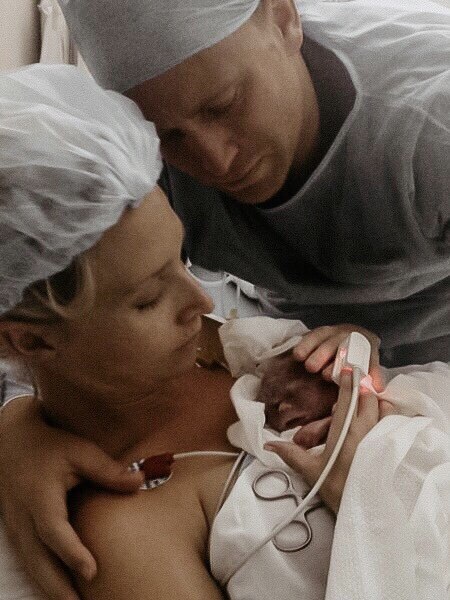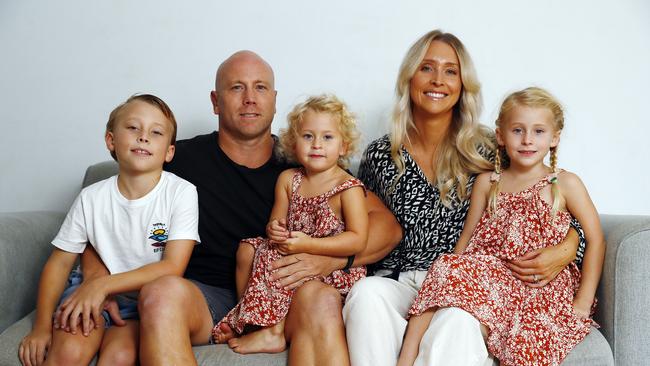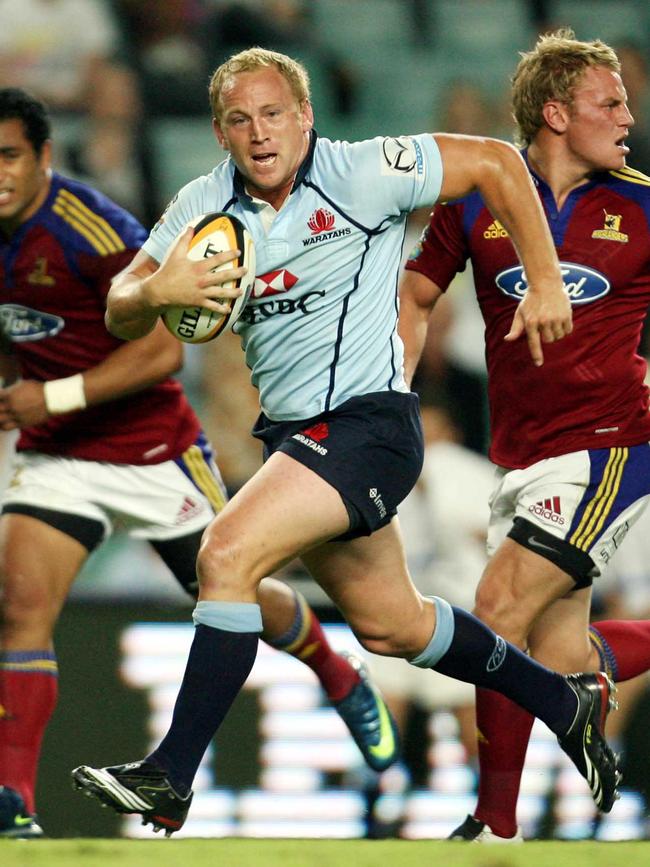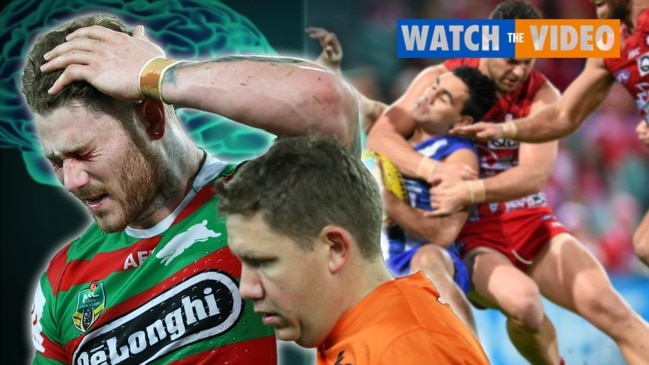How did Brett Sheehan literally get to the edge of the cliff? Depression, PTSD, his stillborn child? No, for the former NRL and Wallabies star it was a hidden killer that almost destroyed everything around him.
BRETT SHEEHAN STOOD on the edge of a cliff, about to make his last decision.
Then his phone rang.
It was his mum. The wild thoughts racing around his head momentarily stopped, and he pulled himself back.
Moments earlier, during a manic suicidal episode, Sheehan had argued with his wife Laura in their northern beaches home.
He’d grabbed her around the neck, she called the police, and Sheehan fled the home to end it all.
“It’s the biggest mistake of my life, I carry it every day, I’ll live with it forever,” Sheehan said.
How did this former Wallaby get here?
“I was in denial,” Sheehan said.
“And people had warned me, saying, ‘Mate, you need to get some help’ and it was that old toxic masculinity, ‘I’ll be right, sweet, move on’, which is what I did.”
Laura has stood by her husband’s side throughout.
![Former Wallaby Brett Sheehan on the long-term effects of concussions [DO NOT ACTIVATE]](https://content.api.news/v3/images/bin/28b58b27fc51ad9af080b1b376b880fa)
“We as a couple have actually been through worse and lived through worse,” she said.
“Our first son was diagnosed meningococcal meningitis at three months of age and we nearly lost him.
“Two weeks after that storm, Brett was sent off to New Zealand on tour. So, again, it was keep going.

“Not many people know that our second child was stillborn, and that was only 18 months later. So while it was a difficult time, it’s not the worst.”
“The doctor’s eyes, sad, meet mine and tapping on his chest I hear him say the words ‘non le coeur’ … no heartbeat.”
Sheehan suffered up to 30 serious concussions during his rugby career. A scan of the 41-year-old’s brain has revealed it is in the same state as that of a 60-year-old.
He has been diagnosed with depression, anxiety, post-traumatic stress disorder (PTSD) and attention deficit-hyperactive disorder (ADHD).
While Sheehan cannot be diagnosed with CTE (chronic traumatic encephalopathy) from repeated head knocks on the football field, he shows all the hallmarks of athletes who have been found to be carrying the disease in their brains after death.
Prior to the incident in October 2019, for which Sheehan was convicted of assault despite Laura’s protestations, he’d been prescribed a higher dosage of ADHD medication dextroamphetamine, which reacted with other medicine and his underlying neurological issues.
Persistent headaches and sensitivity to noise had plagued him.
Those arose during the latter years of Sheehan’s playing career – which began professionally in 2002 when he made his NRL debut for South Sydney Rabbitohs, then included Super Rugby stints at Queensland, NSW and Western Force, seven Test matches for the Wallabies, and finished in the south of France at Narbonne in 2016.
“It started getting worse [after retirement] and then depression and anxiety started creeping in, and unfortunately, suicidal thoughts crept in and there was a number of signs that I was close,” Sheehan said.
“The night of the incident, that was one of them.

“It was scary knowing that this could have been prevented if I had reached out earlier and got help earlier. As I said I was in denial and it cost me a major mistake in my life.
“But that’s one of the reasons why we’re talking about this. If we can help one person, that’s great for us.”
The incident forced Sheehan to seek professional help and he discovered Concussion Connect, a therapy group for sufferers of concussion – and their families – run out of Macquarie University.
It was only then the Sheehans, who have three children – Brody, Daisy and Billy - realised they’re among many families dealing with the same trauma.
“It was a difficult time and a very confronting time for both of us, because I think we were on display very much,” Laura said.


“For Brett, it was the hardest time in his life and the hardest time in our marriage, but also the best when you come out the other side of it, because he went through such a time of self-discovery and self-awareness and trying to understand his mental health, that we’re actually better for it.”
Laura wrote an aching tribute to their stillborn son, Beau, who was delivered in a French hospital on June 19, 2014.
“The doctor’s eyes, sad, meet mine and tapping on his chest I hear him say the words ‘non le coeur’ … no heartbeat,” Laura wrote.
“Screaming in utter disbelief I hear my husband’s voice cracking ‘No!’ crumbling, folding to his knees, a terrified Brody, frightened by the emotion wrapping himself around me, I rock, back and forth, tears breaking, fallen, heaving, broken, my husband, now arms around me, crying, sobbing, words spoken, ‘I’m sorry, I’m sorry, you knew, I should have listened, I’m sorry’. I will never forget that ‘No’ from his lips, the sound it made, the heartbroken gasp before he spoke, it split me, struck me to depths.”

Like many footballers, Sheehan had buried his mental demons throughout his career and believed sport could cure them.
“Being diagnosed with PTSD, from things like our first child getting meningococcal, one of the ways of me dealing was to get back on the field, sweep it under a blanket and tackle the shit out of a bloke on the footy field, and that was my pressure release,” Sheehan said.
“We lost Beau and two weeks later I’m back training on the field and playing footy, instead of being there with my wife who’s just lost our baby.”
While Sheehan is unable to work full-time and has been told his neurological condition will continue to decline, he has not had any suicidal thoughts since the incident 18 months ago.
Sheehan will donate his brain to Sydney’s Brain Bank after death so researchers and his family can have a better understanding of his condition and actions.
“It started getting worse [after retirement] and then depression and anxiety started creeping in, and unfortunately, suicidal thoughts crept in and there was a number of signs that I was close.”
“There’s a lot of things that can contribute to mental health, CTE, because I’m not dead, obviously, we can’t diagnose it, we can’t say CTE was a major factor in it,” Sheehan said.
“But what we do know is repetitive brain injuries like concussion has an effect on your mental health, and that’s been proven.
“This isn’t a justification. It’s just saying that we need to have more money for research into people like myself going forward, so we don’t have suicides and we don’t have people injuring themselves and injuring other people.
“One of the other coping mechanisms in these groups that we go to, it’s been a real eye opener for me as a patient, but also for Laura, seeing other people’s perspectives.
“There’s nothing wrong with admitting that you’ve got an issue, and I think that’s one of the big things with a lot of males especially, for even people with mental health, because other people can’t see that, they don’t want to admit it.
“My advice is admit it straight away, get the help that you need and talk to people.
“There’s a lot of people out there that are willing to help. And I think there’s a lot of people behind closed doors going through similar things.”


‘We cannot get a fix here’ Ex-Wallabies skipper’s retirement fear
“You’d almost rather have a long-term injury.” Those are the words of former Wallabies skipper Dave Porecki, revealing he didn’t know if he’d be back from his gruelling battle with injury.
Waratahs trial standouts, Suaalii injury and a rugby dream for young gun
It’s a time he hated but this painful interlude in Waratahs young gun Henry O’Donnell’s life could well pave the way to his future success in the game. Tahs v Brumbies trial wrap